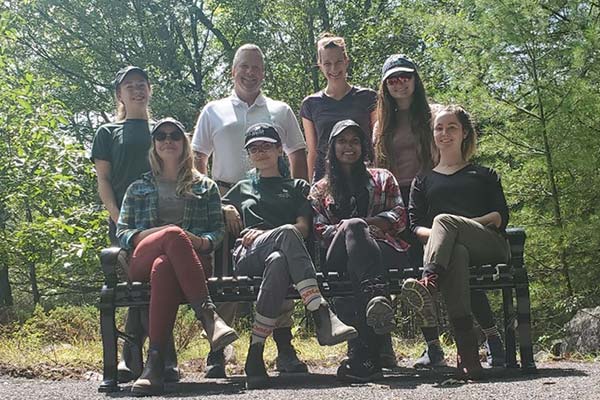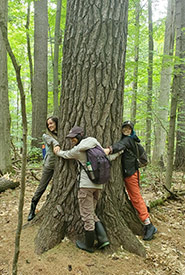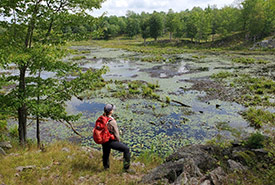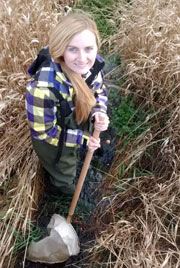A thank you letter to the young professionals of conservation

The 2021 eastern Ontario team at Elbow Lake, ON (Photo by NCC)
Spring is one of the best times to be a conservation biologist with the Nature Conservancy of Canada (NCC). I get to dust off my field boots, turn off my laptop and get back outside. There is a beautiful rhythm to resuming field work, and my to-do list is always the same: see the first spring ephemeral flowers, welcome the returning migratory birds and build a new team of talented, young professionals to help the eastern Ontario stewardship team meet our ambitious conservation and stewardship goals.
The Conservation Internship program is a key part of NCC’s work. It would be impossible to achieve what we do without these dedicated workers. My first job out of college was as an NCC conservation intern, and I truly believe it set me up for a meaningful career in this industry.
I’m just about to say farewell to our 2021 conservation interns. Like I do every summer, we ended the work term by sitting down as a group and talking about everything we learned, explored and appreciated.
There are numerous benefits to having young people on your team, and I’ve been reflecting on why I think there is exceptional value to hiring youth:
1) The satisfaction of watching them grow and learn

2021 Conservation Interns Isabelle Roy, Ashley Harricharan and Nat Gray hugging eastern white pine tree at Gillies Grove, ON (Photo by NCC)
One of my favourite things about the conservation field is how much there is to learn. When we hire interns, they come with varied experiences. Some have no field experience, some have experience in other regions and ecosystems, and others are seasoned professionals for their young age. Regardless of their background, there is something so satisfying about watching them all come into their own as conservation leaders and learn new skills.
As we do field work, I’m constantly quizzing them on species identification, and seeing their confidence and curiosity grow fills me with joy. Conservation interns who came to me convinced they couldn’t tell the difference between a maple tree and an oak tree finish the summer conducting educational public hikes, and those who started out timid are proudly leading their peers in independent field days. Knowing that I played even a small role in setting them up for a successful career in conservation is the most rewarding part of my job.
2) The passion youth bring to the conservation sector

Assistant conservation biologist and former conservation intern, Ally Belanger (Photo by NCC)
There is nothing more invigorating than working with a conservation professional fresh out of school. After years of textbooks and structured lessons, they are keen to put their skills into practice, and that kind of energy is infectious. Whether they’re spending weekends on backcountry camping trips or attending fungi identification workshops in their free time, the passion that technicians bring to the field is undeniable. The youth push everyone in the team to want to learn more and be better. When I’m in the field with a young professional, I see trails I’ve travelled hundreds of times through new eyes, and it drives me to want to be the best supervisor and guide I can be.
3) The new ideas and inspirations they bring to the team
As a young professional who leads fellow youth, I fully admit that I don’t have all the answers. I’m still on my own conservation learning journey, and I am consistently humbled by the knowledge and creativity that our conservation technicians bring to NCC. Over the years, I’ve gotten suggestions on how to plan field days more efficiently, ideas to improve spreadsheets, recommendations for new music and even recipes for delicious field lunches.
There is strength in youth

What the 2021 conservation interns learned this summer (Photo by NCC)
This year, I’m privileged to work with a talented artist, a dedicated leader, a natural interpretive hike planner and a fungi fanatic. Each of these skills enriches the eastern Ontario stewardship team and make us the dynamic force we are. Over the years I’ve learned from skilled carpenters, data entry wizards and expert canoe captains. Sometimes, these talented youth just need a supportive, encouraging environment to explore their own interests, and I’m proud to play a small role in that journey.
But don’t just take my word for it! Hear for yourself what eastern Ontario conservation technicians have to say about their experience in the program:
“I came to NCC from a city life with nothing but a deep appreciation for nature. Now, I feel that I can not only ID various plants, but I have a deeper appreciation for the biodiversity and lush nature outside the city. The way everything in our ecosystem works as one to thrive is beautiful.” – Isabelle Roy (2021)
"Having such an incredible team that is so similar in personalities but so diverse in skills and talents made our eastern Ontario crew one of the best I’ve worked with. I’ve learned so much from everyone, developed an incredible network of new friends and seen so many environments that only a privileged few get to see. I’m so thankful to have been a part of the NCC family!" – Ashley Harricharan (2021)
“I’ve always had a love for science, nature and being active, all mixed with a strong sense of curiosity. My time as a conservation technician taught me so much about the natural world, what it takes to steward land and influenced me to pursue a career in conservation. It gave me the chance to see what it was like to have a job that left me feeling motivated to make a positive impact. Four years later and I’m continually inspired by the land I work on, the people I work with and the mission NCC stands behind.” – Ally Belanger (2017)
I dedicate this blog to all of our technicians, past, present and future. Thank you for the energy you bring to the team. Thank you for reminding me every day why I love my job. Thank you for showing me that the future of conservation is bright. I have immeasurable pride watching you achieve success in your careers, whether you’re going back to school, taking on a new job or travelling the world to get a broader conservation perspective. You may only be with me for a few months, but know that your legacy lives on in eastern Ontario indefinitely.


